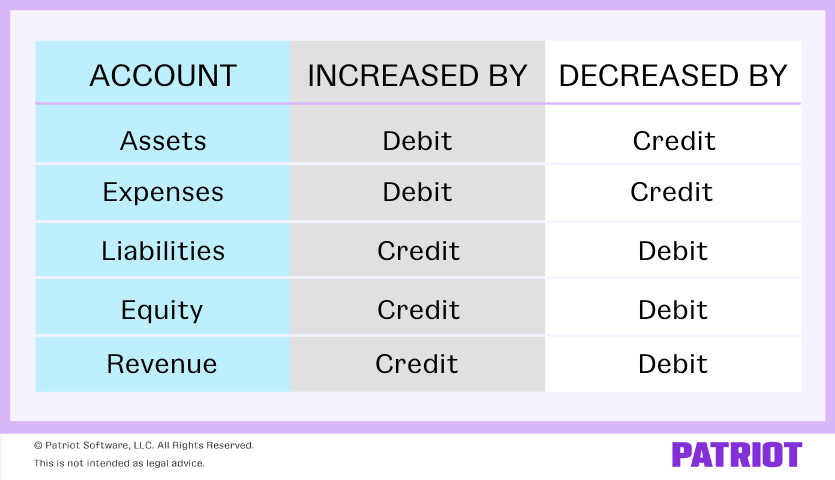You might need heard of the Golden Rule in life: Deal with others as you need to be handled. However, do you know that there’s additionally a golden rule for accounting? The truth is, there are three golden guidelines of accounting. And no … one among them just isn’t treating your accounts the way in which you need to be handled.
If you wish to maintain your books up-to-date and correct, observe the three golden guidelines of accounting.
3 Golden guidelines of accounting
The world of accounting is run by credit and debits. Debits and credit make a ebook’s world go ‘spherical.
Earlier than we dive into the golden guidelines of accounting, it’s worthwhile to brush up on all issues debit and credit score.
Debits and credit are equal however reverse entries in your accounting books. Credit and debits have an effect on the 5 core kinds of accounts:
- Belongings: Sources owned by a enterprise which have financial worth you’ll be able to convert into money (e.g., land, gear, money, automobiles)
- Bills: Prices that happen throughout enterprise operations (e.g., wages, provides)
- Liabilities: Quantities owed to a different individual or enterprise (e.g., accounts payable)
- Fairness: Your belongings minus your liabilities
- Revenue and income: Money earned from gross sales
A debit is an entry made on the left aspect of an account. Debits improve an asset or expense account and reduce fairness, legal responsibility, or income accounts.
A credit score is an entry made on the fitting aspect of an account. Credit improve fairness, legal responsibility, and income accounts and reduce asset and expense accounts.

You need to report credit and debits for every transaction.
The golden guidelines of accounting additionally revolve round debits and credit. Check out the three predominant guidelines of accounting:
- Debit the receiver and credit score the giver
- Debit what is available in and credit score what goes out
- Debit bills and losses, credit score revenue and beneficial properties

1. Debit the receiver and credit score the giver
The rule of debiting the receiver and crediting the giver comes into play with private accounts. A private account is a normal ledger account pertaining to people or organizations.
If you happen to obtain one thing, debit the account. If you happen to give one thing, credit score the account.
Try a few examples of this primary golden rule of accounting under.
Instance 1
Say you buy $1,000 price of products from Firm ABC. In your books, it’s worthwhile to debit your Buy account and credit score Firm ABC. As a result of the giver, Firm ABC, is offering items, it’s worthwhile to credit score Firm ABC. Then, it’s worthwhile to debit the receiver, your Buy account.
| Date | Account | Debit | Credit score |
|---|---|---|---|
| XX/XX/XXXX | Buy | 1,000 | |
| Accounts Payable | 1,000 |
Instance 2
Say you paid $500 money to Firm ABC for workplace provides. It’s good to debit the receiver and credit score your (the giver’s) Money account.
| Date | Account | Debit | Credit score |
|---|---|---|---|
| XX/XX/XXXX | Provides | 500 | |
| Money | 500 |
2. Debit what is available in and credit score what goes out
For actual accounts, use the second golden rule of accounting. Actual accounts are additionally known as everlasting accounts. Actual accounts don’t shut at year-end. As an alternative, their balances are carried over to the following accounting interval.
An actual account might be an asset account, a legal responsibility account, or an fairness account. Actual accounts additionally embrace contra belongings, legal responsibility, and fairness accounts.
With an actual account, when one thing comes into what you are promoting (e.g., an asset), debit the account. Credit score the account when one thing goes out of what you are promoting.
Instance
Let’s say you bought furnishings for $2,500 in money. Debit your Furnishings account (what is available in) and credit score your Money account (what goes out).
| Date | Account | Debit | Credit score |
|---|---|---|---|
| XX/XX/XXXX | Furnishings | 2,500 | |
| Money | 2,500 |
3. Debit bills and losses, credit score revenue and beneficial properties
The ultimate golden rule of accounting offers with nominal accounts. A nominal account is an account that you simply shut on the finish of every accounting interval. Nominal accounts are additionally referred to as non permanent accounts. Momentary or nominal accounts embrace income, expense, and acquire and loss accounts.
With nominal accounts, debit the account if what you are promoting has an expense or loss. Credit score the account if what you are promoting must report revenue or acquire.
Instance: Expense or loss
Say you buy $3,000 of products from Firm XYZ. To report the transaction, it’s essential to debit the expense ($3,000 buy) and credit score the revenue.
| Date | Account | Debit | Credit score |
|---|---|---|---|
| XX/XX/XXXX | Buy | 3,000 | |
| Money | 3,000 |
Instance: Revenue or acquire
Say you promote $1,700 price of products to Firm XYZ. You need to credit score the revenue in your Gross sales account and debit the expense.
| Date | Account | Debit | Credit score |
| XX/XX/XXXX | Money | 1,700 | |
| Gross sales | 1,700 |
On the hunt for a easy strategy to observe your account balances? Patriot’s accounting software program has you coated. Simply report revenue and bills and get again to what you are promoting. Strive it without spending a dime right this moment!
This text has been up to date from its authentic publication date of March 10, 2020.
This isn’t meant as authorized recommendation; for extra data, please click on right here.


